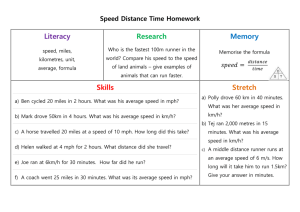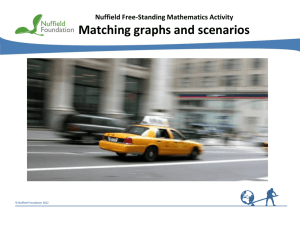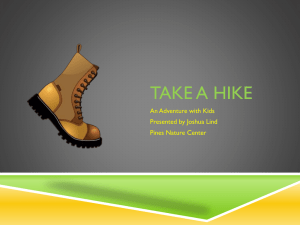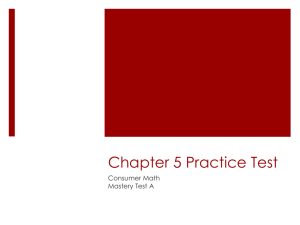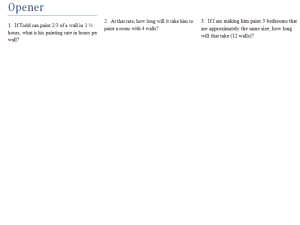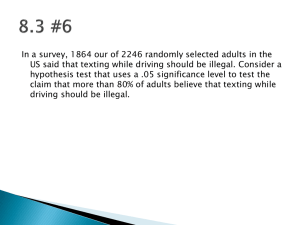Transportation-Safety-Lesson
advertisement
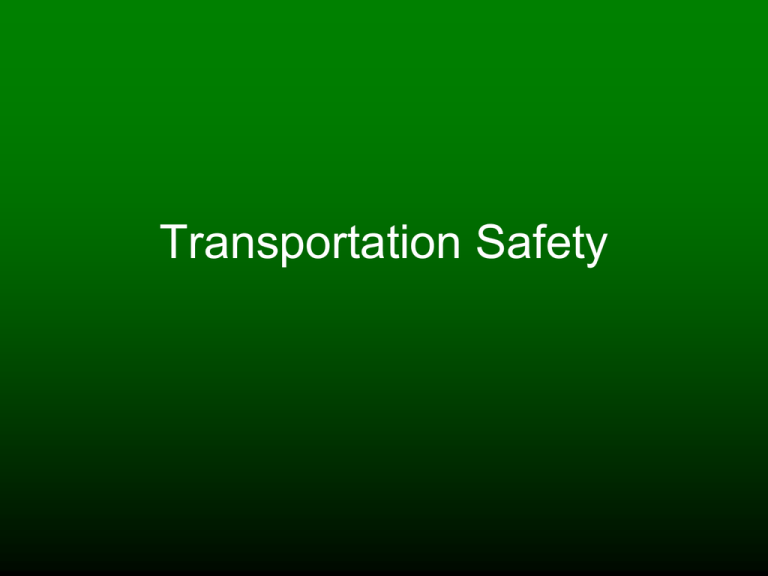
Transportation Safety Objectives • Introduce students to the TDL Career Cluster: Transportation Systems/Infrastructure Planning, Management, and Regulation – Civil Engineering (Transportation Engineering) • (Content Standard #1) • Introduce Students to Transportation Safety Concepts • (Content Standard #2 and #3) Transportation Case Study The objective of this study: – Analyze the current speed compliance ratio of traffic. • How many people do not comply with the speed limit on this stretch of road? – Generate a viable solution targeted to slowing down traffic and making this stretch of road safer for drivers and pedestrians. • Are current traffic speeds unsafe? • If they are unsafe, what can we do to slow down traffic in a safe way? Transportation Safety Background • More than 3 million transportation-related injuries a year (nationwide) • Societal cost: $231 billion a year • Loss to Nebraska: $2 billion a year • Motor vehicle crashes account for 40% of all 16-18 year old deaths in the US. Transportation Safety Background • In Nebraska, 256 people were fatally injured in traffic accidents in 2007. • Downward Trend 300 Nebraska Fatalities 290 280 270 260 250 240 230 2003 2004 2005 2006 2007 Transportation Safety Background As of July 3rd, 2008 • 98 Fatalities – 84 in Rural Areas – 14 in Urban Areas • Compared to the 2004-2007 average – Fatalities are down 23% so far this year in Nebraska Transportation Case Study • We are going to do a case study on a stretch of road just west of Bryan HS 48th street between Glasgow Ave and Giles Road Transportation Case Study STEP 1 DATA COLLECTION • Using a stopwatch, time the cars as they pass between the two landmarks. – Landmarks will be given on next slide • Record your times for each car on the worksheet provided. (Speed Conversion Worksheet) Transportation Case Study STEP 1 • The land marks are: – The pine tree just to the right of the house – The sign by the white building SIGN TREE What Time Did You Get? • Time between the two landmarks: – 2.45 Seconds Transportation Case Study STEP 2 CALCULATE THE SPEED • Now that we have our data, we need to find the speed of the cars in Miles per Hour. • Use the equation for speed Speed = Distance (Miles) / Time (Hours) The distance the cars travel The time it takes for the cars to travel that distance Transportation Case Study STEP 2 • We need to convert FEET per SECOND to MILES per HOUR – There are 5,280 feet in a mile – There are 3,600 seconds in 1 hour Transportation Case Study STEP 2 • First, find the distance the car has traveled in miles: 1 foot = 0.00018939 miles (1 / 5,280) Number of feet the car traveled x .00018939 = Distance Transportation Case Study STEP 2 • Landmark Distance 163 Feet Distance = 163 x .00018939 Distance = .03087057 Miles Transportation Case Study STEP 2 • Now that you have converted the distance from feet to miles, let’s convert the time from seconds to hours: • Insert the time you recorded in seconds into the equation • Number of seconds over 3,600 Number of Seconds =TIME (in hours) 3,600 2.45 Seconds / 3,600 = .00068055 Hours Transportation Case Study STEP 2 • Now let’s insert the TIME and DISTANCE into the Speed Equation: DISTANCE TIME =Speed (MPH) Transportation Case Study STEP 2 • TIME = .00068055 Hours • DISTANCE = .03087057 Miles .03087057 Miles .00068055 Hours = 45.36 MPH Speed Limit = 35 MPH Transportation Case Study STEP 3 • You and a partner will spend 20 minutes collecting data on this stretch of road. • You will time 10 different cars and calculate their speeds – Use worksheet provided Transportation Case Study STEP 3 • Once finished: calculate the Compliance Ratio – Give the percent of vehicles going faster than the posted speed limit (35 MPH) – (# of speeders / 10) x 100 = percent of speeding vehicles (Compliance Ratio) Transportation Case Study STEP 4 • Do we have a problem on this stretch of road? • DISCUSSON – What are the traffic laws in this area? • Speed Limit during SCHOOL? – What is or is not located on or around this stretch of road that may increase traffic speed? – Do you think that the low speed limit through here is important or should it be increased? Transportation Case Study STEP 4 • Using the internet, you and your partner will research possible solutions to slow down the traffic. – Stop Light – Traffic Calming Device – More Enforcement – Speed Bumps • Create a power point presentation to showcase your solution. Career Pathway Transportation, Distribution, and Logistics Transportation Systems/Infrastructure Planning, Management, and Regulation Civil Engineering Transportation Engineering Civil Engineering Video… • Nebraska Career Connections – Civil Engineering Career Video http://www.nebraskacareerconnections.org/ Bear Tracks Bear Tracks is a Bryan High TDL newsletter dedicated to increasing our student’ knowledge of high demand and high wage jobs in the Transportation, Distribution, and Logistics Career pathway.
